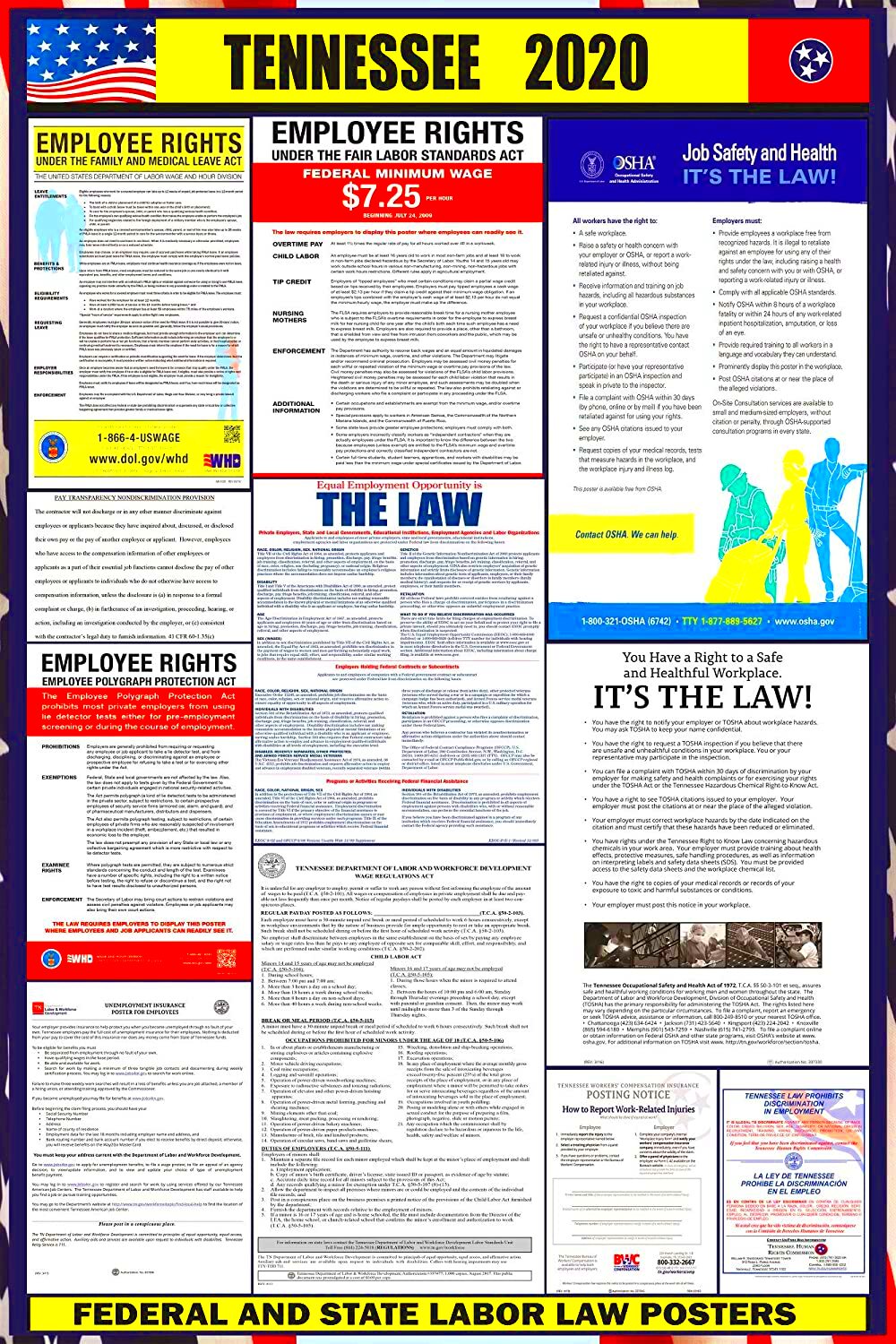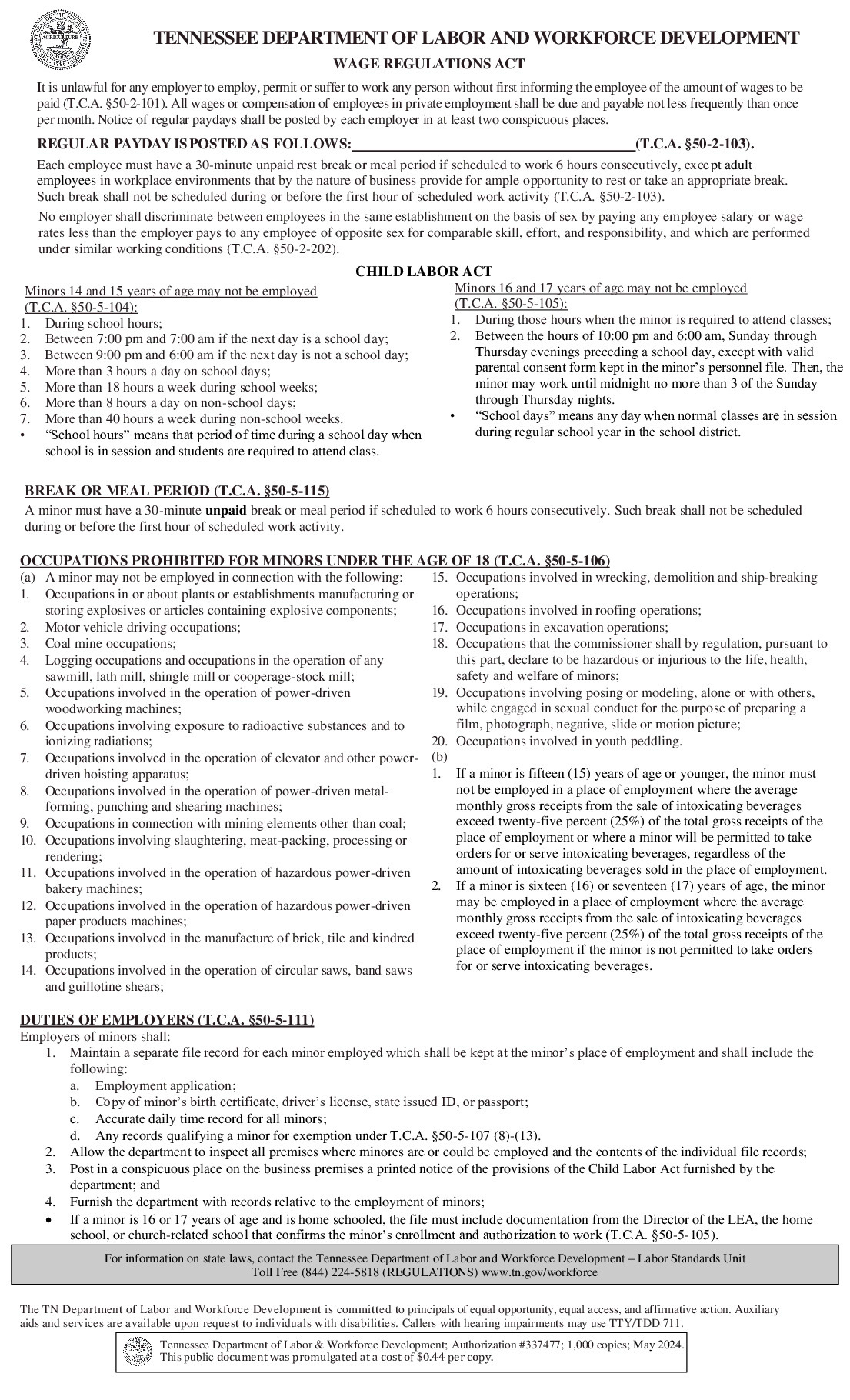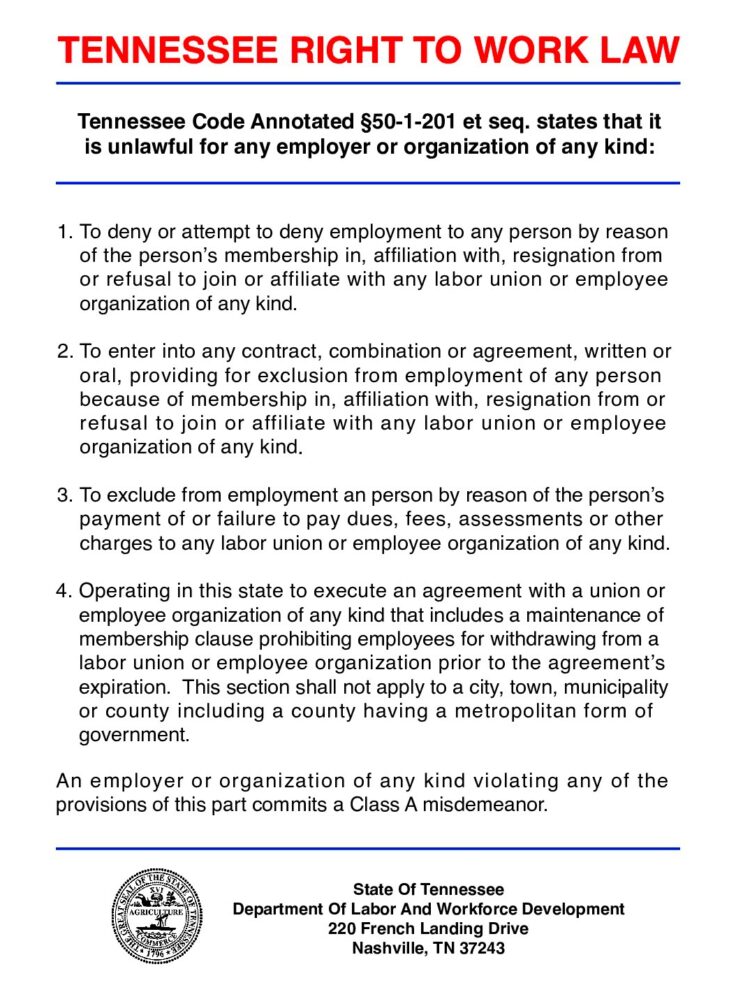Tennessee Employment Regulations: Key Details
Tennessee has specific employment regulations that govern the relationship between employers and employees. Understanding these regulations is essential for both parties to ensure compliance and protect their rights. This post will explore key aspects of Tennessee’s employment laws, including contracts, wage laws, employee rights, and workplace safety. Whether you are an employer or an employee, knowing these details can help create a fair and safe working environment.
Understanding Employment Contracts in Tennessee

Employment contracts are crucial in defining the terms of employment between an employer and an employee. In Tennessee, these contracts can be either written or oral, though written contracts are preferred for clarity and legal enforceability. Here are some key elements to consider:
- Contract Type: Contracts can be at-will, meaning either party can terminate the relationship without cause, or fixed-term, which specifies an end date.
- Essential Terms: A contract should include job responsibilities, compensation, benefits, and termination conditions.
- Legal Considerations: Contracts must comply with state and federal laws, including anti-discrimination laws and wage regulations.
It’s important to consult with a legal professional to ensure your contract is clear and compliant with Tennessee laws.
Wage and Hour Laws in Tennessee

Tennessee’s wage and hour laws dictate how employees are compensated and the rights they have regarding their pay. Here are some key aspects:
| Aspect | Details |
|---|---|
| Minimum Wage: | Tennessee follows the federal minimum wage of $7.25 per hour. |
| Overtime Pay: | Employees must receive 1.5 times their regular rate for hours worked over 40 in a week. |
| Payday Frequency: | Employers must pay employees at least once a month; however, many choose to pay bi-weekly or weekly. |
Employees should keep track of their hours and pay stubs to ensure they are compensated fairly. If discrepancies arise, they can file a complaint with the Tennessee Department of Labor and Workforce Development.
Employee Rights and Protections in Tennessee
In Tennessee, employees have specific rights and protections designed to ensure fair treatment in the workplace. Understanding these rights is crucial for employees to advocate for themselves and for employers to maintain a respectful work environment. Here are some key rights every employee should know:
- Right to Fair Pay: Employees are entitled to receive their wages on time and in full, according to their employment contract.
- Right to Work Free from Discrimination: Employees should not face discrimination based on race, gender, age, religion, or disability.
- Right to Safe Working Conditions: Employers must provide a workplace that is free from hazards and complies with safety regulations.
- Right to Family and Medical Leave: Employees can take unpaid leave for family or medical reasons under the Family and Medical Leave Act (FMLA).
- Right to Privacy: Employees have a reasonable expectation of privacy in their personal belongings and communications.
Understanding these rights empowers employees to stand up for themselves and ensures that they are treated fairly in the workplace.
Workplace Safety Regulations in Tennessee
Workplace safety is a top priority in Tennessee. The state adheres to both federal and state safety regulations to protect employees from hazards. Employers have a responsibility to maintain a safe working environment. Here are some important safety regulations:
- Occupational Safety and Health Administration (OSHA): Tennessee follows OSHA guidelines, which require employers to provide a safe workplace.
- Safety Training: Employers must provide safety training to employees, especially in high-risk industries such as construction and manufacturing.
- Reporting Injuries: Employees are required to report any workplace injuries or safety concerns immediately to their employer.
Employers who fail to comply with safety regulations may face penalties, and employees have the right to report unsafe conditions without fear of retaliation.
Discrimination and Harassment Laws in Tennessee
Tennessee has strong laws against discrimination and harassment in the workplace. These laws are designed to create a safe and respectful environment for all employees. Here are key points regarding discrimination and harassment:
- Protected Classes: Tennessee law protects employees from discrimination based on race, color, national origin, sex, age, disability, and religion.
- Types of Discrimination: Discrimination can occur in hiring, firing, promotions, and job assignments.
- Harassment: Harassment in the workplace based on protected classes is illegal. This includes unwanted comments, jokes, or physical contact.
- Reporting Procedures: Employees who experience discrimination or harassment should report it to their employer or human resources department immediately.
It’s crucial for employees to understand their rights and the procedures for reporting discrimination or harassment, ensuring a respectful and inclusive workplace for everyone.
Termination and Employee Leave Policies in Tennessee
Termination and leave policies are vital aspects of employment in Tennessee. Understanding these policies can help both employees and employers navigate the complexities of ending an employment relationship and taking time off work. In Tennessee, employment is generally “at-will,” meaning employers can terminate employees for almost any reason, as long as it isn’t illegal. Here are some key points regarding termination and leave:
- At-Will Employment: Most employees in Tennessee are employed at-will, allowing either party to terminate the employment without cause or notice.
- Unlawful Termination: Employers cannot terminate employees based on race, gender, age, religion, or disability, which could lead to legal consequences.
- Employee Leave Policies: Tennessee follows the Family and Medical Leave Act (FMLA), which allows eligible employees to take unpaid leave for specific family and medical reasons.
- Paid Time Off (PTO): Employers may offer PTO, but it’s not mandated by law. Policies can vary, so employees should check their company’s guidelines.
Knowing these policies can help prevent misunderstandings and ensure that both parties are aware of their rights and responsibilities regarding termination and leave.
Frequently Asked Questions about Tennessee Employment Regulations
Understanding Tennessee employment regulations can be overwhelming. Here are some frequently asked questions that clarify common concerns:
| Question | Answer |
|---|---|
| What is the minimum wage in Tennessee? | The minimum wage in Tennessee is $7.25 per hour, in line with the federal minimum wage. |
| Can I be fired without notice? | Yes, as Tennessee is an at-will employment state, employers can terminate employment without notice unless otherwise stated in a contract. |
| What protections do I have against workplace discrimination? | Tennessee law protects against discrimination based on race, gender, age, religion, and disability. |
| How do I file a complaint for workplace harassment? | Employees should report harassment to their employer or human resources department as soon as possible. |
These questions help employees understand their rights and obligations under Tennessee employment regulations.
Conclusion on Tennessee Employment Regulations
Understanding Tennessee employment regulations is crucial for both employers and employees. By being informed about contracts, wage laws, employee rights, and workplace safety, individuals can navigate the working environment with confidence. Employees must know their rights regarding termination and leave policies and how to address issues like discrimination and harassment. By fostering an environment of respect and compliance with state laws, Tennessee can promote fair and safe workplaces for everyone. Whether you’re an employee looking to know your rights or an employer striving to comply with regulations, staying informed is key to a positive work experience.


